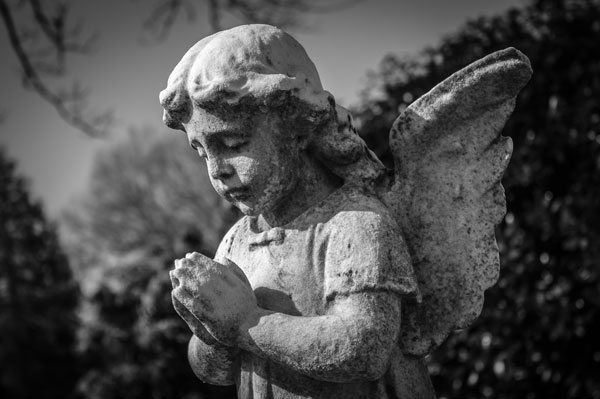This guest post is by Jill Crainshaw.

“Cherub in God’s Acre at Old Salem” in Winston-Salem, NC. by Sheila G. Hunter, used by permission.
A heart-rending image appears in the lectionary for Sunday, January 1, 2017:
A voice is heard in Ramah, lamentation and bitter weeping. Rachel is weeping for her children; she refuses to be consoled, because they are no more.
–Jeremiah 31 and Matthew 2
On the First Sunday after Christmas, mere days after the newborn Jesus has snuggled into the hay of the manger, our star-struck hearts and carol-drenched ears are startled to hear in the Gospel lectionary text Matthew’s horrifying story: “Herod sent and killed all the children who were two years old and under.”
What are we to do with this savage story? Read it in church even though the lights on the Christmas tree are still flickering in our sanctuaries just inches away from the pulpit?
Yes.
Though we may be tempted to avoid the images painted in Matthew 2, to seek safer seas or more beautiful shores from which to launch our boats as we begin 2017, we cannot. The silenced cries of innocents slaughtered in cities across the globe call to us. And through their pain—through Rachel’s weeping—God calls to us too as in this week after Christmas we pack up our nativity scenes to store them away for another year.
God became flesh—Jesus was born into the grittiest, most painful realities of human life. And that means that Christmas—Christianity—is far more than a temporary or sentimental escape pod from the world as it really is. God made Godself vulnerable to a world as violent and uncertain as the one we live in right now. God came to live and walk and laugh and weep in this world, this world where Herod lived and lives. And God calls those of us who sing Christmas joys to the world to face into these unsettling truths and then to let all the love and courage we can muster flow out of our broken hearts to resist and defeat evil in the Christ child’s name until every soul on earth feels its worth.
God came to touch an aching world with grace in and through us. And that, too, is the Gospel message of Christmas.
gloria in excelsis
and suddenly glorias in excelsis deo are ripped apart
by soul-slashing shrieks of women for their babies’
flesh offered up on hellish altars of an evil spell
birthed in power-poisoned cradles of maniacal terror;
no salvation, not for the ones who bore holy
infants, tender and mild, in their wombs
awakening from no sleep in heavenly peace to a
nightmare of babies swaddled in unhallowed graveclothes.
no one, not even God-with-us, pulled their lifeless bodies
from senseless wreckage to breathe into them the breath of life.
O heart-attacked city, how still we see thee lie—
carol-saturated sanctuaries now shattered splinters and shards
and who can make a way in a manger from what remains?
wise ones, perhaps, who risk the rubble when dreams call them to
“Traverse afar!” guided by a hope-birthed burning eye of heaven.
decant your bitter perfume, and don’t travel home by another way.
“Stay.” adore by refusing to be comforted. drink deeply
of Rachel’s tears and weep her baptismal river into desert-ed streets
as you fling your mo(u)rning song to the star-emptied sky
“the hopes and fears of all the years are met in thee tonight.”
 About Jill Crainshaw
About Jill Crainshaw
Jill Crainshaw is a PCUSA minister and Blackburn Professor of Worship and Liturgical Theology at Wake Forest University School of Divinity. She is the author of several books on worship and ministry.
Leave a Reply